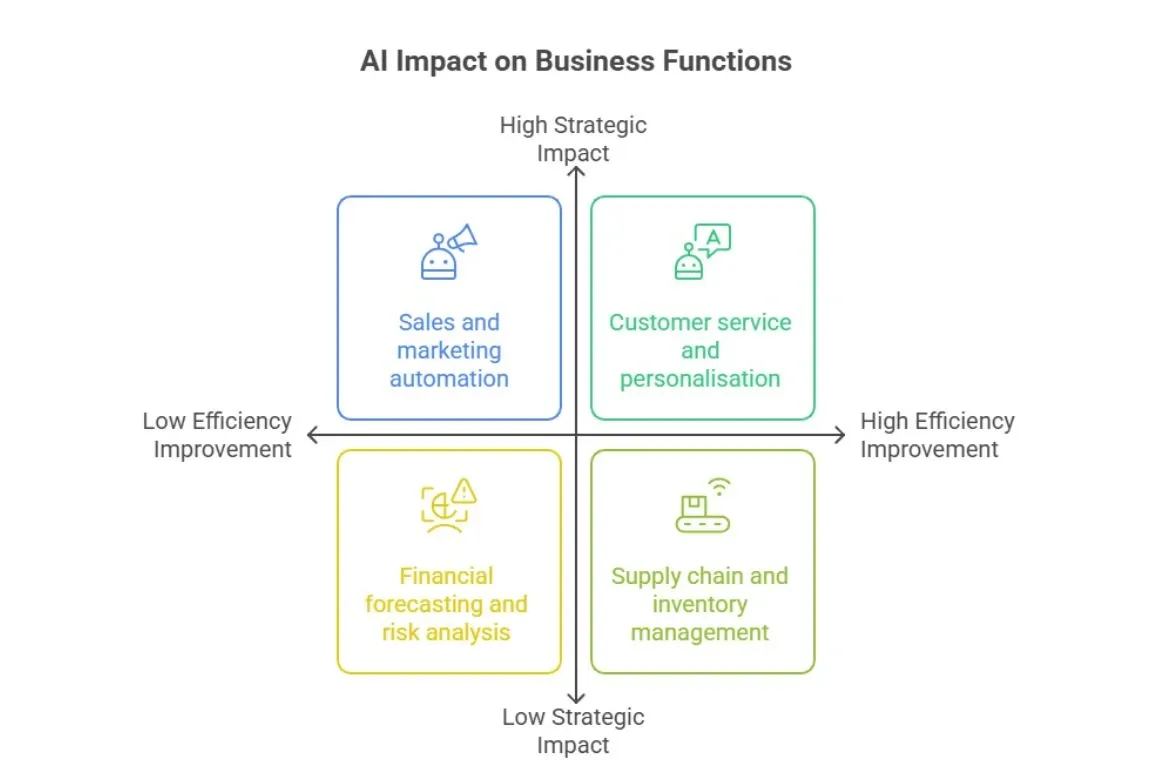How Businesses Are Leveraging AI for Competitive Advantage

In today’s digital jungle, only the agile survive. And agility now has a name, which is, Artificial Intelligence. AI is the secret sauce behind tomorrow’s industry leaders.
Across the globe, and especially in dynamic economies like India, businesses are no longer asking “Should we adopt AI?” but rather, “How fast can we scale it?”
From startups in Bengaluru to conglomerates like Reliance and Tata, everyone is upgrading their businesses by leveraging Artificial Intelligence.
So the message is loud and clear,
”Those who leverage AI now will lead tomorrow”.
AI: A New Beginning.
AI is the beginning of mere technological transformation, it is actually a shift in mindset.
As Sundar Pichai once said, "AI is more profound than fire or electricity." That’s the scale of change we’re witnessing.
AI represents a fundamental change in business operations and competition, unlike any previous tech wave. AI sets itself apart from earlier technological revolutions in both reach and effect. AI targets our thinking abilities.
Why AI Matters in Today’s Business Landscape?
Artificial intelligence has fundamentally altered the competitive business landscape. Companies gain a competitive edge when they effectively implement AI solutions. AI-powered businesses could increase their profit margins.
AI as a driver of competitive advantage
Forward-thinking organisations now see artificial intelligence as a crucial differentiator. AI's most powerful competitive advantage lies in its data analysis capabilities. Businesses can now process and analyse enormous amounts of data through AI that manual processing could never handle.
This leads to quicker and more precise decisions. AI-based insights enable companies to predict market shifts, understand customer behaviour patterns, and identify operational issues before they impact profits.
Leading companies are using AI.
Leading companies are utilising Artificial Intelligence in Retail, manufacturing, Banking, Insurance, and Healthcare.
For example, HDFC Bank is using AI-powered customer service, ICICI Bank is using Robotic Process Automation, and there are other examples like Flipkart and Bigbasket, which are leveraging AI to give their businesses a competitive edge and provide the customers with first-hand services.
Also Read: How AI is Cutting Costs & Boosting Business Efficiency?
Key Business Functions Enhanced by AI
AI is transforming the core of how businesses operate. It makes everything run smoother, more accurate, and keeps customers happier. Let's look at four areas where AI makes the biggest difference.

1. Customer service and personalisation
AI has changed the game in customer service. Businesses can now offer support 24/7 while spending less money. Companies that utilise "AI-infused virtual agents" can reduce customer service costs by up to 30% and enhance customer loyalty.
These AI tools handle basic questions quickly. This enables human agents to tackle larger problems and foster stronger relationships with customers.
2. Sales and marketing automation
AI tools empower sales and marketing teams with unmatched capabilities to target, connect with, and convert customers. These systems spot patterns in customer data that humans might miss. This creates better-targeted campaigns with higher returns. AI tools also determine the optimal time to send marketing messages when customers are most receptive to responding.
Sales teams get a big boost from AI's ability to predict outcomes.The technology spots which lead are most likely to buy, helping teams work smarter. AI also watches customer interactions to predict what they'll need next and suggests the right time to follow up. This makes sales teams much more successful.
3. Supply chain and inventory management
AI brings major improvements to supply chains. Smart algorithms look at past sales, market changes, and outside factors like weather to predict demand changes with amazing accuracy. This helps businesses keep the right amount of stock without wasting money on extras or running out of products.
Warehouses run better with AI, too. The technology studies how materials move through aisles to create better layouts. It plans the quickest routes for workers and robots, making everything run more efficiently and smoothly.
4. Financial forecasting and risk analysis
AI has revolutionised financial forecasting by making sense of complex data patterns. AI makes risk management better by spotting hidden connections in financial data. Risk assessments update automatically as new information comes in, leading to smarter financial decisions.
The technology catches fraud and compliance problems faster than old methods, protecting businesses from losing money and damaging their reputation.
How to Strategically Implement AI in Business?
AI implementation needs a well-planned approach that brings value and reduces risks.. Organisations must focus on three key elements to bridge this gap in AI deployment.
Identifying high-impact use cases
The best way to use AI starts with finding areas where it can add the most value to your business.
Here's how to spot the best opportunities:
- Review business processes systematically to find inefficiencies.
- Look at areas where AI can help with skill gaps or repetitive work.
- Create an AI-first scorecard to review your organisation's adoption readiness.
- Pick use cases based on potential returns and how much effort they take.
Aligning AI with business goals
AI must connect directly to core business objectives to deliver its full value. This involves matching AI projects with specific targets, such as revenue growth, customer retention, or streamlined processes.
Early stakeholder involvement in goal-setting will help gain support and ensure that AI projects address real business needs. Leadership must play a key role in connecting AI initiatives with company priorities and providing the necessary resources.
Business teams working together with technical teams helps close knowledge gaps. This teamwork makes sure AI solutions work well technically and bring commercial value.
Balancing innovation with security
Companies must strike a balance between innovation and security as they adopt AI. The ever-changing nature of AI development often leads to a 'move fast and break things' mindset that might skip important safety steps.
Good AI governance should stay flexible and work through agreement. This helps responsible deployment while tackling risks like data exposure and software stability. AI technologies create new weak points that attackers might target, including training data poisoning and prompt injection.
Measuring the Impact of AI on Business Performance
Measuring the value of artificial intelligence investments needs a sophisticated measurement approach. Traditional business metrics by themselves don't capture AI's full effect. This requires new frameworks that arrange technical performance with business outcomes.
New metrics for AI success
We can adopt the new matrics for measuring the AI access Many AI projects only display technical metrics, such as precision and recall, which don't demonstrate real business value. Organisations should focus on business metrics, like, such as revenue, profit, savings, and customers acquired, that directly connect to organisational goals.
Tracking customer satisfaction and engagement
Customer experience metrics show clear evidence of AI's business effect.Engagement metrics like first contact resolution, response time, and customer retention rates give valuable insights into AI effectiveness. Teams can use sentiment analysis to measure customer emotions during interactions and tailor experiences for better outcomes.
Evaluating operational efficiency improvements
Operational efficiency metrics measure AI's effect on business processes. These include productivity indicators that show concrete improvements in reduced call handling times and document processing speeds. AI-driven predictive maintenance helps extend asset lifespans and reduces operational costs now and in the future.
Organisations should track these metrics for a detailed evaluation:
- Time-to-value: How fast AI projects show meaningful results
- Cost savings: Legacy system costs versus AI solutions
- Resource efficiency: Person-hours saved or moved to higher-value work
The most successful measurement approaches connect these metrics to financial outcomes and translate operational improvements into measurable business value.
Future-Proofing Your Strategy for a Competitive Advantage
"The only sustainable competitive advantage is an organisation's ability to learn faster than the competition."
And one can gain this ability by:
- Staying updated with AI trends
- Building a culture of innovation
- Investing in continuous learning and adaptability.
Conclusion
AI has evolved from a technological novelty to a mission-critical force across industries. So, it's time to stop viewing AI as just another tool in your tech stack and start treating it as a business transformer.
What sets the current wave apart is the rise of Generative AI in business, which not only automates tasks but also enables creativity, personalisation, and strategic foresight at scale. Whether it’s generating product designs, content, or predictive insights, generative AI is giving businesses the tools to reinvent how they engage, operate, and compete.
To drive value, AI efforts must align with business priorities. Start with high-impact areas where AI can solve real-world challenges, such as personalised customer journeys, automated product design, or predictive maintenance.
Success needs more than technical excellence. Your performance indicators must blend technology with impact, think customer satisfaction, operational agility, and revenue uplift, not just precision or uptime. These are the real signs of AI ROI.
In a rapidly shifting marketplace, your ability to leverage AI, especially generative AI, can define your trajectory. When done right, AI doesn’t just improve processes, it reinvents how value is created, captured, and delivered.
Click here to learn more about how generative AI is providing a competitive advantage to organisations.
Frequently Asked Questions
Q1. How does AI provide a competitive advantage for businesses?
AI boosts decision-making through real-time analytics, enabling data-backed and timely choices. It also automates processes, reducing costs and freeing up human resources for more strategic tasks. Companies leveraging AI effectively can see an increase in productivity and significant improvements in customer satisfaction.
Q2. What steps can businesses take to future-proof their AI strategy?
To future-proof their AI strategy, businesses should stay updated with AI trends through regular reviews and flexible technology adoption. Building a culture of innovation that encourages experimentation is crucial. Investing in continuous learning and adaptability for the workforce is also essential, as AI is expected to significantly impact job roles in the coming years.
Q3. Why is AI considered more than just another technological upgrade for businesses?
Unlike previous technological revolutions, AI targets cognitive abilities and decision-making processes rather than just automating physical tasks. It represents a fundamental shift in how businesses operate and compete, requiring a comprehensive transformation of organisational structures and processes. AI's rapid development and wide-ranging applications make it a transformative force, reshaping entire industries.

TalentSprint
TalentSprint is a leading deep-tech education company. It partners with esteemed academic institutions and global corporations to offer advanced learning programs in deep-tech, management, and emerging technologies. Known for its high-impact programs co-created with think tanks and experts, TalentSprint blends academic expertise with practical industry experience.



